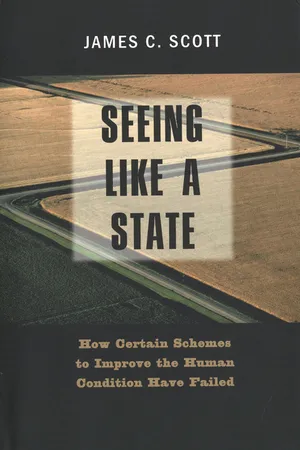
Seeing Like a State
How Certain Schemes to Improve the Human Condition Have Failed
- 464 pages
- English
- PDF
- Available on iOS & Android
About this book
Compulsory ujamaa villages in Tanzania, collectivization in Russia, Le Corbusier's urban planning theory realized in Brasilia, the Great Leap Forward in China, agricultural "modernization" in the Tropics-the twentieth century has been racked by grand utopian schemes that have inadvertently brought death and disruption to millions. Why do well-intentioned plans for improving the human condition go tragically awry?
In this wide-ranging and original book, James C. Scott analyzes failed cases of large-scale authoritarian plans in a variety of fields. Centrally managed social plans misfire, Scott argues, when they impose schematic visions that do violence to complex interdependencies that are not-and cannot-be fully understood. Further, the success of designs for social organization depends upon the recognition that local, practical knowledge is as important as formal, epistemic knowledge. The author builds a persuasive case against "development theory" and imperialistic state planning that disregards the values, desires, and objections of its subjects. He identifies and discusses four conditions common to all planning disasters: administrative ordering of nature and society by the state; a "high-modernist ideology" that places confidence in the ability of science to improve every aspect of human life; a willingness to use authoritarian state power to effect large- scale interventions; and a prostrate civil society that cannot effectively resist such plans.
Frequently asked questions
- Essential is ideal for learners and professionals who enjoy exploring a wide range of subjects. Access the Essential Library with 800,000+ trusted titles and best-sellers across business, personal growth, and the humanities. Includes unlimited reading time and Standard Read Aloud voice.
- Complete: Perfect for advanced learners and researchers needing full, unrestricted access. Unlock 1.4M+ books across hundreds of subjects, including academic and specialized titles. The Complete Plan also includes advanced features like Premium Read Aloud and Research Assistant.
Please note we cannot support devices running on iOS 13 and Android 7 or earlier. Learn more about using the app.
Information
Table of contents
- Contents
- Acknowledgments
- Introduction
- Part 1. State Projects of Legibility and Simplification
- Chapter 1. Nature and Space
- Chapter 2. Cities, People, and Language
- Part 2. Transforming Visions
- Chapter 3. Authoritarian High Modernism
- Chapter 4. The High-Modernist City: An Experiment and a Critique
- Chapter 5. The Revolutionary Party: A Plan and a Diagnosis
- Part 3. The Social Engineering of Rural Settlement and Production
- Chapter 6. Soviet Collectivization, Capitalist Dreams
- Chapter 7. Compulsory Villagization in Tanzania: Aesthetics and Miniaturization
- Chapter 8. Taming Nature: An Agriculture of Legibility and Simplicity
- Part 4. The Missing Link
- Chapter 9. Thin Simplifications and Practical Knowledge: Metis
- Chapter 10. Conclusion
- Notes
- Sources for Illustrations
- Index